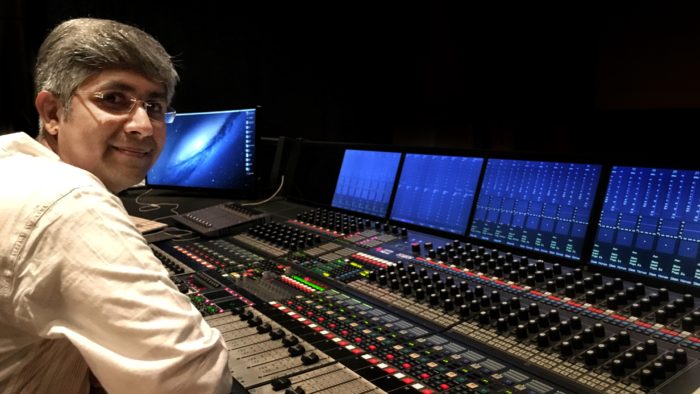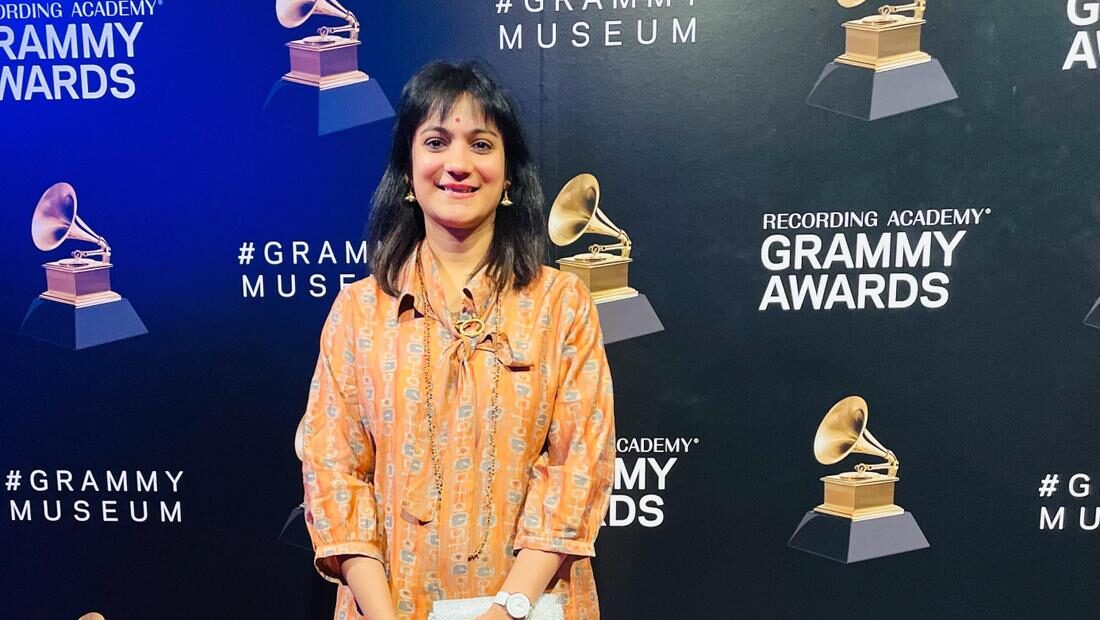Sai Shravanam combines the best aspects of technology with the sublimity of Indian classical music. He has arranged the Indian score elements and also recorded the Indian music for the The Man who Knew Infinity, a Hollywood biopic on legendary Indian mathematician Srinivasa Ramanujan.
Shravanam believes “Music is not something that we can learn if we want to. It has to be given to us by birth. So, we don't choose Music, Music chooses us!!
A self-trained tabla player, Sharavanam has given several performances worldwide and is also a composer. However, what sets him apart is that he is one of the few classically trained sound engineers in the country. He has closed the gap between Indian classical music and international music recording standards.
In the year 2012, his versatility fetched him commendable recognition as a Sound Recordist/Additional Engineer for the Academy award winning film “Life of Pi.
Can you recount briefly your journey of taking music from Chennai to Hollywood?
In the year 2006, I had met William Rogers who had initially introduced me to the sound of Hollywood in literal sense. He mentored me to understand how the soundscape, recording and post productions techniques were executed in the west. This made me develop my passion towards increasing the sound quality of my existing productions and my very approach. I have been self-trained and when I see sign boards through various people across my path of Sound design, I end up going towards the right destination called "Satisfaction".
In 2011, I was approached to record something for an international client and Bombay Jayashri, for whom I have recorded for years before, asked me to connect with a team which wanted to know some technical details of my studio. Later I realized it was the Team from Fox Studios. They wanted me do remote location recording, which was very advanced at that time. It’s like, an artiste would be singing or playing in one continent and the recording is monitored live and even edited across the seas in another continent. I was very new to it. But the CHALLENGE to get this working and the passion to make it work ended up with me completing the recordings for Life of Pi movie from Chennai to LA.
A leading Karnatic musician recently remarked that film music is not classical music. It uses ragas but cannot be said to be classical music because it does not have a structure. What are your views on this?
Classical Music is something that has evolved with Tradition. When artistes sustain a particular way of rendition for a prolonged time which has been accepted by the listeners, it then becomes tradition. In India, we are very culturally rich and this has also led us to have various forms of music like classical, folk, Sugama sangeet, Bhajans and Abhangs, Ghazals…so many forms. It’s only the mind and the possession of what we know which has made us bifurcate and divide music. The source of music is all the same. In fact one note "SA" has all the notes embedded in it harmonically, theoretically and practically speaking. In film music, it’s no more the interpretation of music by the artiste to their potential or expertise. It’s what is required for the screen. This is the most important aspect of Film Score!!! Sometimes classical music and its influences are what would pitch the composer into making a song or a score for the movie. This may not be ‘pure’ form of classical music to one, but may be classically rich to someone else. Finally, it’s the perception of every listener and their understanding of what is classical music.
Take for instance a movie in the west like Spiderman or the Karate Kid. They had orchestral scores played by classical orchestras and beautifully written music. They do not divide Mozart or Beethoven or Bach as classical and the score as non-classical. They do understand the requirements of the score, they are classically trained in orchestral writing and incorporate ideas and harmonies for executing what’s required for the current era.
You are known to use only classical music in the films you are associated with. What elements of classical music have you incorporated in the two Hollywood films you have worked in?
In the movie Life of Pi, I was only a Sound Recordist and was the first to successfully establish a remote location recording for a movie of this scale. The artistes I was involved with were classical musicians.
"The man who knew Infinity" was a completely different ball game. I was the ‘Indian Music Producer’ and ‘Co-writer’ of the score, apart from recording it in India at my studio, RESOUND INDIA. The Music Director Coby Brown told me it was a story on Ramanujan and what immediately struck me was the scope of using South Indian instruments. Invariably, we use a lot of North Indian instruments which are sonically more resonant than ours. But, this is not a limitation when you record in a studio and capture the nuances of every instrument. I chose the Veena, Indian bamboo flute, morsing, Mridangam, Ghatam, Kanjira apart from Dilruba and Tabla as well. These instruments are rarely used in Western Productions.
During the project execution I had to listen to the already existing score by the orchestra and derive at a proper raga that would suit the chords/harmonies. Also, the choice had to be something that would go with chromatic scales.
How is the role of music and sound different in the two films? One has such great potential for music and sound, and the other is a biopic. How was your task different for the two movies?
As I had mentioned, I had to record and was technically involved in the Music Recording for the movie Life of Pi. In TMWKI it’s completely a different soundscape. A Bio Epic has much lesser content of music and no dramatisation aurally. The music just needs to fill the spaces of emotions that we see on screen. Also the more minimal, the better for the movie, especially with Ramanujam!
You say that recording in India is state of the art but there is little awareness…
Yes, sound engineering has become a fancy hobby amongst youngsters today because of abundant resources like computers, electronics and educational material in Social media and the internet. But, Sound Engineering is not a science, it’s an ART. Most of the music that India is producing is electronic. Where you have to capture sonically rich instruments like the sitar, veena, harp, guitar, tabla, or for the matter any instrument you would need post production and production capabilities. And for sound to evolve, you need space. Which implies you need beautiful studios that would help resonate the instruments and voice. This in turn needs to be captured in brilliantly designed microphones through various gadgets which are artistically made. Only then the source sound is beautiful and would we be able to derive original sound. This aspect is a forgotten story in modern day music where sound samples are used even for acoustic instruments.
There needs to be more articles in the media from authentic sources on this. There have to proper institutes that train people's ears to sound and not their brains alone. ‘Ear Training’ is the most important aspect. India may need to open up more in this avenue when we see a lot of youngsters currently deeply interested in sound production.
How have your sensibilities in music shaped the way you do the work that you do?
I have not learnt music, I have only been a keen listener. In the process I ended up learning. Music is not something that we can learn if we want to. It has to be given to us by birth. So, we don't choose music, Music chooses us!
I was named ‘Shravanam’ By Sri Sathya Sai Baba when I was 4 years old. Today All I do is Listen and my life is revolving around listening. What can I say but just be humbled with the Grace of God that is able to sustain music and sound in me.
Without knowing music one cannot be a sound engineer. And being a tabla player and an arranger, this has made me understand not just frequency handling but music handling. The success of sound is not dependant on the mixing, it is wholly dependent on how well the music is produced and recorded. And from the recording stage I plan the music and guide artistes in making alteration to their performance creating space and layers for me to mix a much better track than what it would be otherwise.
How is it recording Carnatic Vocal music? How does one optimise the listening experience?
Carnatic music or rather any classical form of music is one's expression of the song. It varies with every artiste in aspects of tonal quality, diction, physical movements etc. It’s not easy to capture classical music as it’s dynamically very rich and you will not be able to restrict an artiste to not move their head or body away from the microphone.
Also, classical music has such intricate dynamics. In fact many songs have different loudness levels even within themselves. This is due to the lyrical content of the song that demands softness or hardness in its musical emotion. This leads to spikes and transients in both vocals and instrument. Also, our music is mostly single pitch based. So all the accompanying artistes tune to a fundamental root apart from the tanpura which constantly again gives the pitch. This leads to a concentration and adding up of the same notes, instead of harmony from all the performers. For eg, the violin or veena has to follow the same notes as the song that is rendered by the vocalist. The mridangist also pauses and punctuates the song as it’s written. So this is almost monotonic improvisation.
To get this kind of music recorded and mixed needs knowledge of classical music. Classical Indian music needs sensitivity and great care in handling it.
You have recorded music of many leading musicians. Any interesting anecdotes.
By God's grace I have recorded almost all the premier musicians of our country. One of them was Guru Karaikuadi Mani. Once during a recording, Mani sir was playing mridangam to a metronome. And half way through the take the headphone amplifier failed. He continued to play the mridangam until his solo portion was over with at most concentration and precision, not even realising that his headphone wasn’t working. When I played back the track back with the click, with razors edge precision his notes had fallen to the metronome without any sort of deviation whatsoever, which is a challenge. This was indeed a lesson that metronome is not in the machine but in ourselves. Mani sir proved to be a human metronome.
Another incident I remember is about Balamuralikrishna sir. When he had come to record last year, he had a song to write and sing. Today's youngsters and musicians have forgotten the habit for notating music properly and singing a song fully. They want to go line by line or paragraph by paragraph.
BMK sir had come into the studio and was notating the song, eventually he was singing it and making corrections with Rajkumar Bharathi who had composed the tune for that song. I told BMK sir that we could take it in parts so that there was less stress on him to make such elaborate notes. He smiled. He completed writing the song, sang it, made all the alterations and correction on his notes. Not just that but he also made a fair copy once again with final set of notations and then went into the booth for singing. This shows what ‘Professionalism’ means. He finished the song in one take!





